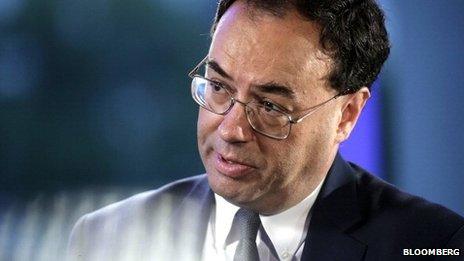Vince Cable: Reconsider Help to Buy scheme
- Published
Business Secretary Vince Cable: "The rating agency Standard & Poor's...is expressing serious worries"
The Help to Buy scheme to lift the housing market should be reconsidered by the government, according to Business Secretary Vince Cable.
He told the BBC: "We certainly need to look at that [scheme] again. It was conceived in very different circumstances."
Help to Buy has been criticised by some who say it has boosted house prices too quickly.
Mr Cable talked of a "raging housing boom" in London and the South-East.
He warned of a danger of the Bank of England not raising interest rates and "of course this boom that's taking place in house prices gets out of control and the only people who can afford to live in large parts of London are foreigners and bankers".
Mr Cable also told the Andrew Marr Show the ratings agency Standard and Poor's, which gives the UK its top AAA credit rating, is "expressing worries" on the impact of Help to Buy.
Under the second phase of the Help to Buy scheme, launched in October, first-time buyers across the UK only need to provide a small deposit, with the government offering a guarantee of 15% of the loan to buy new and old homes valued at no more than £600,000.
Critics have suggested that these new loans are fuelling an artificial housing bubble and expressed concerns about how it will be brought to an end.
The UK housing market has continued to rise in 2013, fuelled mostly by London and the surrounding counties. An economics professor from Warwick University recently claimed house prices were overvalued in 10 of 13 regions in the UK when compared with incomes, raising the risk of a fall at some stage in the future.
'Free-for-all'
Separately, the head of the UK's financial services regulator said it will take action if it feels the housing market is overheating.
"We are watching the housing market very carefully," Andrew Bailey told the Sunday Telegraph, external.
He said the central bank will use its powers to make sure a "free-for-all" in the mortgage market is avoided.
The regulator could force banks to hold more capital or ask for more stringent mortgage checks, he said.
Mr Bailey is the head of the Prudential Regulation Authority (PRA), which ensures the stability of financial services firms and is part of the Bank of England, where he is deputy governor.
"We've laid out the tools that we can use. That is hugely important - that we have set out our desire to see robust mortgage underwriting standards [and that] will be part of the approach," he told the Sunday Telegraph's business editor Kamal Ahmed, who is to become the BBC's business editor next year.

Andrew Bailey says the central bank "will use those tools" it has to cool house prices, if needed
"The thing I stress is that we will use those tools," Mr Bailey said, adding that he does not think the housing market is in a bubble yet.
The Halifax said earlier this month that the average home in the UK was now valued at £174,910, following the 10th successive monthly increase in prices, but it added that the UK market had not returned to the levels seen during the housing boom.
The average price was still 12% below the August 2007 peak, it said.
In an attempt to ensure that relatively cheap mortgages do not fuel an "overheated" market, the Bank of England at the end of November refocused the Funding for Lending Scheme (FLS) on business, not mortgage borrowers.
Under the scheme, banks and building societies were allowed to borrow up to £60bn cheaply from the Bank of England, as long as they then loan that money on.
Governor Mark Carney said that supporting mortgage lending was "no longer necessary" and FLS will be refocused on businesses from January 2014.
Mr Cable said at the time the decision to reform the FLS terms was "very wise".
The interactive content on this page requires JavaScript